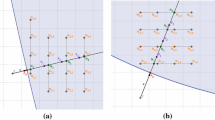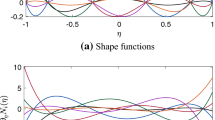Abstract
The reciprocal polynomial extrapolation was introduced in Amat et al. (J Comput Math 22(1):1–10, 2004), where its accuracy and stability were studied and a linear scalar test problem was analyzed numerically. In the present work, a new step in the implementation of the reciprocal polynomial extrapolation, ensuring at least the same behavior as the Richardson extrapolation, is proposed. Looking at the reciprocal extrapolation as a Richardson extrapolation where the original data is nonlinearly modified, the improvements that we will obtain should be justified. Several theoretical analysis of the new extrapolation, including local error estimates and stability properties, are presented. A comparison between the two extrapolation techniques is performed for solving some boundary problems with perturbation controlled by a small parameter ϵ. Using two specific boundary problems, the error and the robustness of the new technique using centered divided differences in a uniform mesh are investigated numerically. They turn out to be better than those presented by the Richardson extrapolation. Finally, investigations on the accuracy when using a special non-uniform discretization mesh are presented. A numerical comparison with the Richardson extrapolation for this particular case, where we present some improvements, is also performed.
Similar content being viewed by others
References
Amat, S., Busquier, S., Candela, V.: Reciprocal polynomial extrapolation. J. Comput. Math. 22(1), 1–10 (2004)
Ascher, U.M., Mattheij, R.M.M., Russell, R.D.: Numerical Solution of Boundary Value Problems for Ordinary Differential Equations. SIAM Classics in Applied Mathematics (1995)
Bruder, J., Strehmel, K., Weiner, R.: Partitioned adaptive Runge-Kutta methods for the solution of nonstiff and stiff systems. Numer. Math. 52(6), 621–638 (1988)
Doolan, E.P., Miller, J.J.H., Schilders, W.H.A.: Uniform Numerical Methods for Problems with Initial and Boundary Layers, Boole Press, Dublin (1980)
Herceg, D., Vulanović, R., Petrović, N.: Higher order schemes and Richardson extrapolation for singular perturbation problems. Bull. Aust. Math. Soc. 39, 129–139 (1989)
Kaps, P., Wanner, G.: A study of Rosenbrock-type methods of high order. Numer. Math. 38(2), 279–298 (1981/82)
Kulkarni, R.P., Grammont, L.: Extrapolation using a modified projection method. Numer. Funct. Anal. Optim. 30(11–12), 1339–1359 (2009)
Lee, J.Y., Greengard, L.: A fast adaptative numerical method for stiff two-point boundary value problems. SIAM J. Sci. Comput. 18(2), 403–429 (1997)
Liu, T., Yan, N., Zhang, S.: Richardson extrapolation and defect correction of finite element methods for optimal control problems. J. Comput. Math. 28(1), 55–71 (2010)
Lubich, Ch., Ostermann, A.: Linearly implicit time discretization of non-linear parabolic equations. IMA J. Numer. Anal. 15(4), 555–583 (1995)
Bulirsch, R., Stoer, J.: Introduction to Numerical Analysis. Springer (2002)
Urbani, A.M., Marfurt, M.: Improvements of the linearly implicit Euler method. Int. J. Appl. Math. 7(4), 383–388 (2001)
Vulanović, R., Herceg, D., Petrović, N.: On the extrapolation for a singularly perturbed boundary value problem. Comput. 36, 69–79 (1986)
Author information
Authors and Affiliations
Corresponding author
Additional information
Research of Sergio Amat and Sonia Busquier was supported in part by the Spanish grants MICINN-FEDER MTM2010-17508 and 08662/PI/08.
Research of María José Legaz was supported in part by Becas de Iniciación a la Investigación 2010 de la Universidad Politécnica de Cartagena (30.05.21.44.46).
Rights and permissions
About this article
Cite this article
Amat, S., Busquier, S., Legaz, M.J. et al. Reciprocal polynomial extrapolation vs Richardson extrapolation for singular perturbed boundary problems. Numer Algor 61, 631–647 (2012). https://doi.org/10.1007/s11075-012-9555-0
Received:
Accepted:
Published:
Issue Date:
DOI: https://doi.org/10.1007/s11075-012-9555-0




